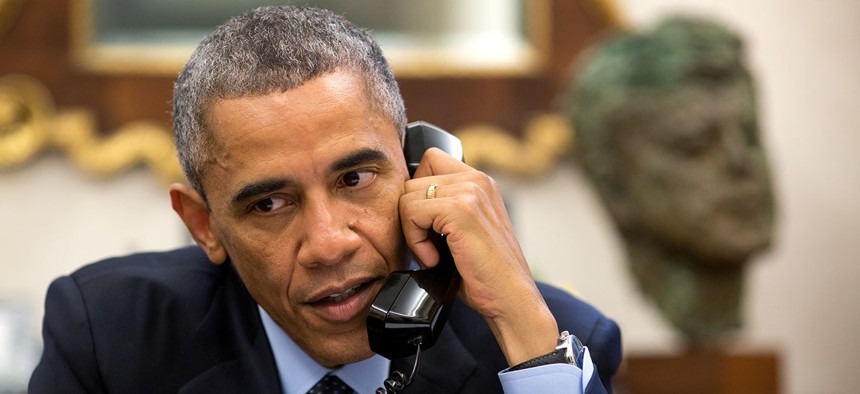
Pete Souza/White House file photo
The President Is Trying to Finish the Obamacare Sales Job
Now that the Supreme Court has ruled in favor of the Affordable Care Act, it's time for another White House PR effort.
He's won over the Supreme Court; now President Obama is intent on finally winning Americans over on his signature health care law.
The White House has been criticized, even by its supporters, for not telling a coherent story that explains how the Affordable Care Act has benefited tens of millions of Americans in ways that might not be obvious to them. Polling has reinforced that critique: The law has been in place for years and 16 million Americans have gained health coverage, but Obamacare is still underwater with the general public.
It is a problem that Obama and his top officials seem acutely aware of and one they are turning their attention to now that the King v. Burwell case isn't an existential threat to the law.
"Everybody who has health insurance benefitted from this law, even though a lot of folks don't know it," Obama said Wednesday at a town hall meeting in Nashville, Tennessee. Later in the afternoon, the president planned to hold a Twitter question-and-answer session, another part of the renewed outreach effort.
He ticked off the provision that lets young adults stay on their parents' insurance until age 26, drug discounts for seniors, the law's prohibition on charging women more than men for their coverage, and the ban on discriminating against people with preexisting conditions as some policies that most people support but don't necessarily associate with the ACA.
"There are a whole host of things that fall under the ACA that are benefitting 100, 150 million people. They may just not be aware of it," the president said during the Nashville event.
Obama said he was hoping that the Court's decision last week to uphold the law's insurance subsidies nationwide would lead to "constructive conversation" about how to improve the law, in contrast to the last few years of partisan absolutism around Obamacare.
"Part of what I'm hoping is with the Supreme Court case now behind us, what we can do is now focus on how we can make it even better, because it's not as if we solved all our problems in the health care system," he said. He referenced cost containment and quality of care as obvious areas for new policymaking.
And though he seemed to avoid Medicaid expansion by name, that will be another big issue for the administration in the final stretch, one that will help determine whether Obamacare reaches its goal of near-universal health coverage. Tennessee is one of 21 states that have not expanded the low-income insurance program, though its governor and many in the legislature are open to it and have talked with the Department of Health and Human Services about an alternative expansion plan.
There again, the belief is that the Court's ruling and the assurance that the ACA will remain in place for the foreseeable future will convince more states to relent and expand the program.
"My hope is that on a bipartisan basis, we can now focus on what we have learned, what's working, what's not working," Obama said, adding later in apparent reference to Medicaid expansion: "There's still a lot of people who aren't insured."
In a briefing with reporters last week, HHS Secretary Sylvia Mathews Burwell also said that one of her priorities for the last 18 months of the administration was "making sure people understand that the ACA is not just about the marketplace and the uninsured."
She named many of the same provisions as Obama did Wednesday, also noting that the law requires health plans to provide free preventive care.
"We need to make and help people understand that more," Burwell said.






